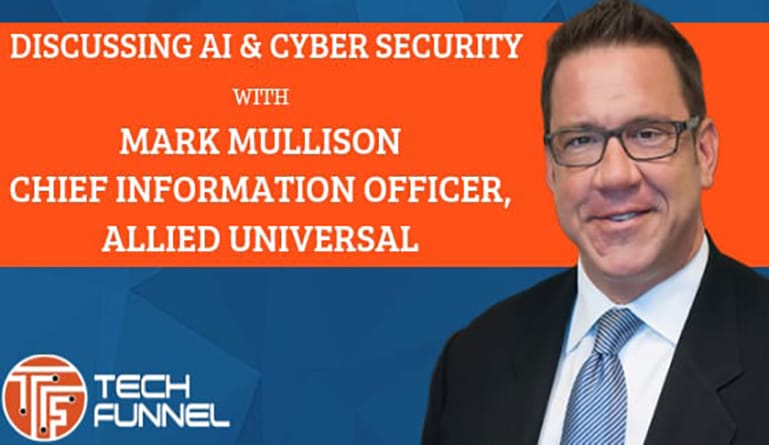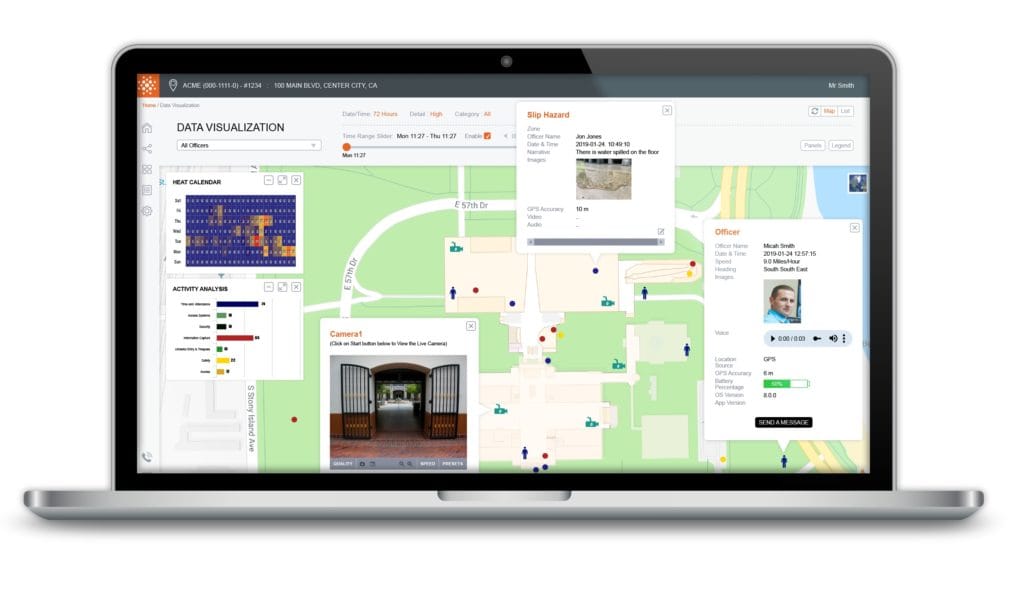As Chief Information Officer (CIO) for Allied Universal®, Mark Mullison is responsible for both internal and client facing technology innovation. He is an innovative and dynamic leader who enjoys working with people to build, apply and operate technology that creates value by offering strategic solutions.
With more than 20 years of extensive experience in product development, information technology, and global operations, Mullison has a proven track record of integrating people, processes, and technology into world-class products and operating environments that deliver measurable ROI. Prior to joining Allied Universal, Mullison was Executive Vice President & CIO for Education Corporation of America (ECA), where he was responsible for providing strategy and thought leadership to the company’s systems integration, automation and learning technology efforts.
Throughout his career, he has successfully managed over $300 million in technology solutions– from concept to the operation–in over 65 countries around the world for companies including Sprint, Alcatel, Orange Business Services, Level 3 Communications, and U.S. Security Associates. In 2006, Mullison founded Landmark Technologies Corporation to provide technology and management consulting services that improve the operating performance of companies with complex global operations.
He received a bachelor’s degree in Computer Science from the University of Michigan and has completed the Essentials of Management Program at the Wharton School of Business. He is currently pursuing a master’s degree in Computer Science from the Georgia Institute of Technology with a specialization in Interactive Intelligence.
DANNI WHITE: Tell us a little about your company, Allied Universal.
MARK MULLISON: Allied Universal provides unparalleled service, systems, and solutions to serve, secure and care for the people and businesses of our communities. Allied Universal is North America’s leading security services provider employing more than 200,000 people with revenues exceeding $7 billion.
For more than 60 years, Allied Universal has been providing proactive security solutions and cutting-edge smart technology to deliver evolving, tailored solutions that allow clients to focus on their core business. Allied Universal is responsible for protecting client sites covering multiple specialty sectors such as higher education, healthcare, retail, commercial real estate, government, and corporate campuses.
Allied Universal has offices located throughout the nation and internationally (Canada, Honduras, Mexico, Nicaragua and the United Kingdom). Since 1957, Allied Universal has been keeping people safe, protecting our clients’ brands and providing peace of mind.
DW: You have launched an advanced AI platform to improve safety and reduce risk with on-site protective services? How does the platform actually work?

At first glance, it may look like just another tour or incident management system but don’t be fooled. HELIAUS® is different. Security Professionals, when armed with the mobile application, have everything they need to most effectively do their job—and take actions that are designed to prevent incidents.
Did you know that other tour and incident management systems still rely on the detect and respond model? HELIAUS® is a give-and-get system. What this means is information captured with a HELIAUS® mobile device will be absorbed into a larger data source. Powered by an Artificial Intelligence (AI) engine using proprietary algorithms, the technology is able to identify patterns of risk and generate recommendations designed to prevent an incident from occurring.
Utilizing blue tooth and GPS technology, HELIAUS® automatically prompts tour action and facilitates immediate communication and response. This means no matter where a Security Professional is posted at a client site, they are always connected, always situationally aware, and primed to react most effectively. The AI uses this information to understand what’s likely to happen at a client’s site regarding safety and security incidents and then automatically suggests workflows to our security professionals reduce accidents and crime.
DW: How can companies benefit from this type of technology at their disposal?
MM: HELIAUS® is beneficial for a company’s safety program because it brings sophisticated data visualization capability to allow security operators to understand the who, what, where and when both in real-time and historically, which increases situational awareness and helps users develop powerful insights.
DW: Can you give a few case examples of how your AI focused technology has been put into action to date?
MM: Media & Entertainment Sector – A major Hollywood production studio was able to identify and address their workplace hazards with Allied Universal’s HELIAUS™. This production studio has over 50 acres to protect, so little things can add up fast, especially as it’s a site that’s a buzz of activity and construction. A stray electrical cord here, a dripping water hose there, and soon enough, you’ll find losses mounting from trip-and-fall injuries and facility damage. By implementing HELIAUS™, the studio has been able to manage hazards effectively – preventing them from turning into costly insurance claims and work disruptions. HELIAUS™ is also providing the studio with the intelligence it needs to make safety improvements and informed training programs, which are proactive measures that are helping it to sharply reduce the number of workplace hazards. We were able to yield a 48% reduction in safety hazards and over $2 million in loss avoidance with the studio’s implementation of HELIAUS™.
Manufacturing Sector – When you manufacture perishable goods, mistakes matter. An elevated temperature in a truck trailer isn’t an inconvenience; it’s a critical health issue. To avoid mistakes and associated costs, a major food manufacturer knew they needed an upgrade to their antiquated paper record keeping. They needed a better way to track compliance and eliminate errors. They found the solution with our AI-driven technology, HELIAUS™. We created a customized compliance application that tracked over 140 unique incident types. A cost value was assigned to the incident types which enabled them to quantify the financial savings of incidents that were eliminated, such as an incorrect trailer number at the gate, trespasser occurrences or a driver without proper identification. Increased accuracy and enhanced tracking uncovered savings and efficiencies with our customized reporting feature and over $55 million in potential losses were avoided at a single site.
Logistics Sector – When the crux of your business is delivering packages to anxiously awaiting customers, two things matter above all else: getting the client’s package to its destination and getting it there fast. Shipping carriers leverage multiple technology advancements to facilitate accuracy, speed, and effectiveness, from fully-automated hubs that quickly scan, sort and weigh packages to using algorithms to calculate optimized delivery routes. When every second count, the last thing they want is a slow and inefficient security team to jeopardize their operations. Yet, that is exactly what was happening at a national package delivery company’s truck yard in southern California. The pen-and-paper security process for checking in and checking out trucks to the yard was averaging two-and-a-half minutes for each truck. More than cumbersome, the process was impacting their bottom line. During peak times, trucks were crowded at the gate, awaiting processing and wasting time.
With the mobile application from HELIAUS™, the security team is now processing trucks in and out of the yard 233% faster. “The time to do it before was at least 2.5 minutes; now it is down to 45 seconds,” the shipper’s security manager reported. “And it’s capturing even more data.” This represents a savings of 105 seconds, and with a company that has a fleet of over 100,00 vehicles, saving 105 seconds per truck, twice a day, saves 5,800 hours across their team, every day. The average cost of trucks drivers is $28.75 per hour, excluding vehicle-based costs reports the American Transportation Research Institute. This means, collectively freeing 5,800 hours of processing times directly results in saving $166,750 daily which adds up to more than $60 million in one year.






